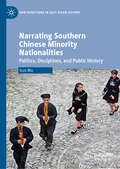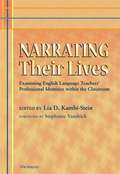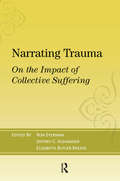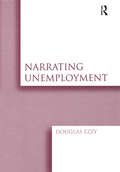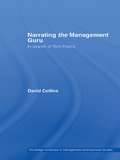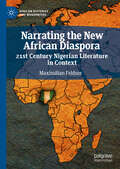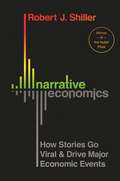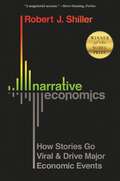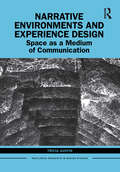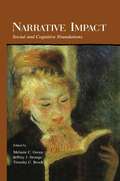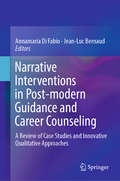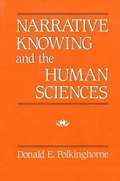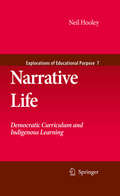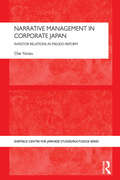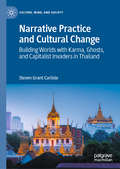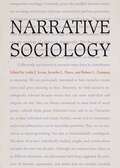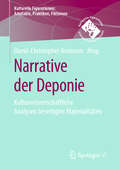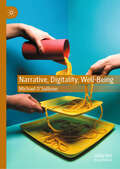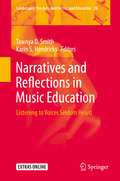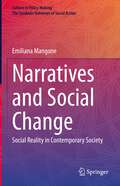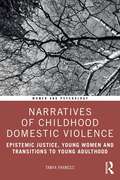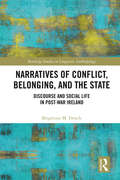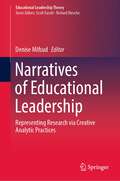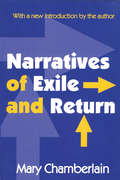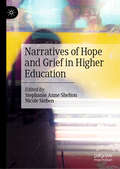- Table View
- List View
Narrating Southern Chinese Minority Nationalities: Politics, Disciplines, and Public History (New Directions in East Asian History)
by Guo WuBased on fieldwork, archival research, and interviews, this book critically examines the building of modern Chinese discourse on a unified yet diverse Chinese nation on various sites of knowledge production. It argues that Chinese ideology on minority nationalities is rooted in modern China's quest for national integration and political authority. However, it also highlights the fact that the complex process of conceptualizing, investigating, classifying, curating, and writing minority history has been fraught with disputes and contradictions. As such, the book offers a timely contribution to the current debate in the fields of twentieth-century Chinese nationalism, minority policy, and anthropological practice.
Narrating Their Lives: Examining English Language Teachers' Professional Identities Within The Classroom
by Stephanie Vandrick Lia Kamhi-Stein“…a groundbreaking book that will…engage, inform, and connect with present and future teachers and teacher educators. ” ---Stephanie Vandrick, Foreword to Narrating Their Lives The field of TESOL has called attention to the ways that the issues of race and ethnicity, language status and power, and cultural background affect second language learners’ identities and, to some degree, those of teachers. In Narrating Their Lives, Kamhi-Stein examines the process of identity construction of classroom teachers so as to make connections between their personal and professional identities and their instructional practices. To do that, she has selected six autobiographical narratives from teachers who were once part of her TESL 570 (Educational Sociolinguistics) class in the MA TESOL program at California State University, Los Angeles. These six narratives cover a surprisingly wide range of identity issues but also touch on broader instructional themes that are part of teacher education programs. Because of the reflective nature of the narratives—with the teachers using their stories to better understand how their experiences shape what they do in the classroom—this volume includes provocative chapter-opening and reflective chapter-closing questions. An informative discussion of the autobiographical narrative assignment and the TESL 570 course (including supplemental course readings and assessment criteria) is also included.
Narrating Trauma: On the Impact of Collective Suffering
by Jeffrey C. Alexander Ronald Eyerman Elizabeth Butler BreeseThrough case studies that examine historical and contemporary crises across the world, the contributing writers to this volume explore the cultural and social construction of trauma. How do some events get coded as traumatic and others which seem equally painful and dramatic not? Why do culpable groups often escape being categorised as perpetrators? These are just some of the important questions answered in this collection. Some of the cases analysed include Mao's China, the Holocaust, the Katyn Massacre and the Kosovo trauma. Expanding the pioneering cultural approach to trauma, this book will be of interest to scholars and postgraduate students of sociology.
Narrating Unemployment
by Douglas EzzyDrawing on the emerging field of narrative theory in sociology and psychology, this book argues that an individual’s response to job loss is a product of the shape of the story a person tells about their experience. This, in turn, is a product of both individual creativity and the structuring effects of their social location. Based on a qualitative study of the experience of unemployment in Australia, three main types of job loss narratives are identified. First, romantic narratives describe job loss as a positive experience of liberation from an oppressive job, leading to a gradually improving future. Second, tragic narratives describe job loss as undermining a person’s life plan, leading to a phase of depression, anxiety and self-deprecation. Finally, job loss narratives may be complicated by marital breakdown or serious illness. The book breaks new ground in its use of narrative theory to account for the variations in responses to unemployment.
Narrating the Management Guru: In Search of Tom Peters (Routledge Advances In Management And Business Studies)
by David CollinsDavid Collins, a well respected scholar of management gurus proves a critical reappraisal of the very influential work of Tom Peters. This volume examines his key works and reviews his detractors, offering an analysis of his contributions to the field of management that goes beyond the simple chronological model that has previously been used. Colli
Narrating the New African Diaspora: 21st Century Nigerian Literature In Context (African Histories and Modernities)
by Maximilian FeldnerThis book provides the first comprehensive survey and collection of Nigerian diaspora literature, offering readings of novelists such as Chimamanda Ngozi Adichie, Sefi Atta, Helon Habila, Helen Oyeyemi, Taiye Selasi, Chika Unigwe, Chris Abani, and Ike Oguine. As members of the new African diaspora, their literature captures experiences of recent Nigerian migration to the United States and the United Kingdom. Examining representative novels, such as Adichie’s Half of a Yellow Sun and Americanah, Habila’s Waiting for an Angel, Abani’s GraceLand, and Oyeyemi’s The Icarus Girl, the book discusses these novels’ literary and narrative methods and provides detailed analyses of two of the most common themes: depictions of migratory experiences and representations of Nigeria. Placing the novels in their relevant historical, sociological, philosophical, and theoretical contexts, Narrating the New African Diaspora presents an insightful study of current anglophone Nigerian narrative literature.
Narrative Economics: How Stories Go Viral and Drive Major Economic Events
by Robert J. ShillerFrom Nobel Prize–winning economist and New York Times bestselling author Robert Shiller, a new way to think about how popular stories help drive economic eventsIn a world in which internet troll farms attempt to influence foreign elections, can we afford to ignore the power of viral stories to affect economies? In this groundbreaking book, Nobel Prize–winning economist and New York Times bestselling author Robert Shiller offers a new way to think about the economy and economic change. Using a rich array of historical examples and data, Shiller argues that studying popular stories that affect individual and collective economic behavior—what he calls "narrative economics"—has the potential to vastly improve our ability to predict, prepare for, and lessen the damage of financial crises, recessions, depressions, and other major economic events.Spread through the public in the form of popular stories, ideas can go viral and move markets—whether it's the belief that tech stocks can only go up, that housing prices never fall, or that some firms are too big to fail. Whether true or false, stories like these—transmitted by word of mouth, by the news media, and increasingly by social media—drive the economy by driving our decisions about how and where to invest, how much to spend and save, and more. But despite the obvious importance of such stories, most economists have paid little attention to them. Narrative Economics sets out to change that by laying the foundation for a way of understanding how stories help propel economic events that have had led to war, mass unemployment, and increased inequality.The stories people tell—about economic confidence or panic, housing booms, the American dream, or Bitcoin—affect economic outcomes. Narrative Economics explains how we can begin to take these stories seriously. It may be Robert Shiller's most important book to date.
Narrative Economics: How Stories Go Viral and Drive Major Economic Events
by Robert J. ShillerFrom Nobel Prize–winning economist and New York Times bestselling author Robert Shiller, a groundbreaking account of how stories help drive economic events—and why financial panics can spread like epidemic virusesStories people tell—about financial confidence or panic, housing booms, or Bitcoin—can go viral and powerfully affect economies, but such narratives have traditionally been ignored in economics and finance because they seem anecdotal and unscientific. In this groundbreaking book, Robert Shiller explains why we ignore these stories at our peril—and how we can begin to take them seriously. Using a rich array of examples and data, Shiller argues that studying popular stories that influence individual and collective economic behavior—what he calls "narrative economics"—may vastly improve our ability to predict, prepare for, and lessen the damage of financial crises and other major economic events. The result is nothing less than a new way to think about the economy, economic change, and economics. In a new preface, Shiller reflects on some of the challenges facing narrative economics, discusses the connection between disease epidemics and economic epidemics, and suggests why epidemiology may hold lessons for fighting economic contagions.
Narrative Environments and Experience Design: Space as a Medium of Communication (Routledge Research in Design Studies)
by Tricia AustinThis book argues narrative, people and place are inseparable and pursues the consequences of this insight through the design of narrative environments. This is a new and distinct area of practice that weaves together and extends narrative theory, spatial theory and design theory. Examples of narrative spaces, such as exhibitions, brand experiences, urban design and socially engaged participatory interventions in the public realm, are explored to show how space acts as a medium of communication through a synthesis of materials, structures and technologies, and how particular social behaviours are reproduced or critiqued through spatial narratives. This book will be of interest to scholars in design studies, urban studies, architecture, new materialism and design practitioners in the creative industries.
Narrative Impact: Social and Cognitive Foundations
by Melanie C. Green Jeffrey J. Strange Timothy C. BrockThe impact of public narratives has been so broad (including effects on beliefs and behavior but extending beyond to emotion and personality), that the stakeholders in the process have been located across disciplines, institutions, governments, and, indeed, across epochs. Narrative Impact draws upon scholars in diverse branches of psychology and media research to explore the subjective experience of public narratives, the affordances of the narrative environment, and the roles played by narratives in both personal and collective spheres. The book brings together current theory and research presented primarily from an empirical psychological and communications perspective, as well as contributions from literary theory, sociology, and censorship studies. To be commensurate with the broad scope of influence of public narratives, the book includes the narrative mobilization of major social movements, the formation of self-concepts in young people, banning of texts in schools, the constraining impact of narratives on jurors in the court room, and the wide use of education entertainment to affect social changes. Taken together, the interdisciplinary nature of the book and its stellar list of contributors set it apart from many edited volumes. Narrative Impact will draw readership from various fields, including sociology, literary studies, and curriculum policy. Providing new explanatory concepts, this book: *is the first account on the psychology of narrative persuasion and brings together the relevant conceptualizations from within various sectors of psychology together with the major issues that concern cognate disciplines outside of psychology; *focuses on understanding the mechanisms that underlie the power of public narratives to achieve broad historical and social changes; *offers breakthroughs to the future: the role of "presence" in virtual reality narratives; the role of "zines" in females' fashioning of their selves; and the central role of imagery in transportation into narrative worlds; *explains varying roles of emotion in narrative immersion; and *addresses the growing blurring of fact and fiction: mechanisms and implications for beliefs and behavior.
Narrative Interventions in Post-modern Guidance and Career Counseling: A Review of Case Studies and Innovative Qualitative Approaches
by Annamaria Di Fabio Jean-Luc BernaudThis book presents an international review of the principle new post-modern narrative interventions in Guidance and Career Counseling. With contributions from the most important scholars in the field this volume presents new qualitative approaches and tools to assess the effectiveness of narrative interventions. It provides a critically needed review of case studies regarding the most innovative and updated interventions. This volume explores the field of Guidance and Career Counseling according to the most recent post-modern theories in career construction, life construction and life meaning, the psychology of working and the relational theory of working. It offers an international perspective for the application of effective post-modern Guidance and Career Counseling interventions to facilitate individuals’ life and career management. The volume serves as a fundamental instrument and reference for researchers, professionals, counselors, career counselors, professors, and students interested in the field.
Narrative Knowing and the Human Sciences
by Donald PolkinghorneThis book expands the concept of the nature of science and provides a practical research alternative for those who work with people and organizations. <p><p> Using literary criticism, philosophy, and history, as well as recent developments in the cognitive and social sciences, Narrative Knowing and the Human Sciences shows how to use research information organized by the narrative form―such information as clinical life histories, organizational case studies, biographic material, corporate cultural designs, and literary products. The relationship between the narrative format and classical and statistical and experimental designs is clarified and made explicit. Suggestions for doing research are given as well as criteria for judging the accuracy and quality of narrative research results.
Narrative Life: Democratic Curriculum and Indigenous Learning
by Neil HooleyWritten with educational practitioners in mind and set in a framework of progressive epistemology and pedagogy, this work tackles issues of global concern. It seeks to answer the question of how we structure education for the world's 370 million indigenous people so as to promote intercultural understanding, maximize opportunity and right colonial wrongs. Hooley's work details an innovative curriculum design for indigenous school children based on the principles of participatory narrative inquiry, as well as exemplars of indigenous knowledge. Written from an Australian perspective, the book discusses broad international issues that impact on schooling such as globalisation, democratic education and whiteness and raises significant questions regarding indigenous culture and knowledge. Taking inspiration from the works of John Dewey and Paulo Freire, Hooley asserts that a curriculum based on participatory narrative inquiry recognises and respects the interests and rights of local Indigenous communities. Further, it provides a mechanism for linking with white mainstream curricula through the compilation of portfolios of student work and exemplars of knowledge across all subjects areas. This model views formal schooling as a central aspect of a child's personal, family and community narrative and does not impose knowledge from without, but constructs knowledge from within. Learning is given an indigenous context and thus two-way inquiry between cultural viewpoints is encouraged. Narrative Life makes an original contribution to Indigenous education worldwide, and does so across all settings of primary and secondary schooling.
Narrative Management in Corporate Japan: Investor Relations as Pseudo-Reform (The University of Sheffield/Routledge Japanese Studies Series)
by Chie YorozuScandals and failures in some of the best known international Japanese-owned companies have shown that there is sometimes a considerable difference between the public and internal narratives of Japanese firms. This book explores the extent to which Japanese firms' public claims reflect wider reality. Exploring how and why corporate narrative-management is 'accepted' or 'rejected' by external and internal audiences in Japan, the book clarifies what narrative-management means for Japanese organizations. It argues that the role of narrative-management has become much more prevalent in Japan in recent years, but that it does not serve quite the same role as it does in the Western environments where the theory and practice first emerged. The author presents interview-based case studies within four very different large Japanese organisations, all of which have deployed and loudly announced new restructuring plans based largely on Western models of corporate 'best practice'. The book aims to describe and account for these Japanese corporate narratives, and asks what they are, why they are deployed and who believes in them. As the first narrative-related work in the Japanese context, this volume provides an insight into the development of Japanese narrative-management. It will appeal to students and scholars of Japanese Business, International Business and Organizational Studies.
Narrative Practice and Cultural Change: Building Worlds with Karma, Ghosts, and Capitalist Invaders in Thailand (Culture, Mind, and Society)
by Steven Grant CarlisleThis book presents a unique approach to person-centered anthropology, providing a new form of practice theory that incorporates and explains sources of cultural change. Built around the learning and use of autobiographical narrative forms, it draws from, and expands on, phenomenological, psychological, and moral anthropological traditions. The author draws on extensive original fieldwork in Thailand to explore questions including: how Buddhism has dealt with the appearance of global capitalism; and why some Thais continue to pursue nirvana-oriented Buddhist practices when karma-oriented reward-systems seem to be more satisfying as a whole. Where previous person-centered ethnographies have explored the ways in which social forces cause individuals to conform to cultural norms, this work advances the analysis by focusing on how ideas are transmitted from individuals to into wider society. This book will provide fresh insights of particular interest to psychological, phenomenological and narrative anthropologists; as well as to researchers working in the fields of religious and Asian studies.
Narrative Sociology
by Jennifer L. Pierce Leslie J. Irvine Robert ZussmanThis book defines classics, identifies exemplars of narrative analysis, and delineates a field in the making.
Narrative der Deponie: Kulturwissenschaftliche Analysen beseitigter Materialitäten (Kulturelle Figurationen: Artefakte, Praktiken, Fiktionen)
by David-Christopher AssmannDie Deponie ist eine paradoxe, risikobehaftete Einrichtung. Die moderne Gesellschaft erhofft sich durch sie, weggeworfene, unbrauchbare oder gefährliche Dinge, Stoffe oder Substanzen ein für alle Mal sich selbst überlassen zu können. Zugleich erfordern die entsprechenden Ablagerungsstellen erhebliche Aufmerksamkeit und technischen Aufwand. Auch wenn die Deponie ihre Legitimation aus der Annahme zieht, den auf ihr angesammelten Müll zu domestizieren, ist sie trotz aller Versicherungen und Vorkehrungen nämlich eines gerade nicht: abgeschlossen. Die Beiträge dieses Bandes nehmen diese Beobachtung zum Ausgangspunkt. Sie fragen nach den ökologisch problematischen und ästhetisch produktiven Implikationen der Anhäufung beseitigter Materialitäten und deren Verknüpfungen mit literarisch-kulturellen Diskursen. In exemplarischen Probebohrungen eröffnen sie Perspektiven einer literatur-, medien- und kulturwissenschaftlichen Untersuchung der Deponie. Zwei bisher eher getrennt voneinander operierende akademische Wissensbereiche werden dazu zusammengebracht: Studien auf dem Gebiet des Ecocriticism mit solchen der kulturwissenschaftlichen Analyse von Praktiken und Poetiken des Sammelns und Archivierens. Die Deponie wird so sichtbar als ein dynamisch-agentielles Konglomerat aus sozialen Praktiken, Diskursen und Materialitäten, mit denen Narrative u.a. aus Literatur, Fotografie, Film und Computerspielen verwoben sind.
Narrative, Digitality, Well-Being
by Michael O’SullivanNarrative, Digitality, Well-Being Narrative, Digitality, Wellbeing adopts a transdisciplinary approach in exploring new forms of narrative that have emerged in a digital age, an age of new online practices that are both associated with increased risk and enhanced sense of identity. The book examines new literary narratives, new philosophies of digitality, and new approaches to cross-disciplinary work between narrative theory and psychology in the context of digital environments, interactions, and practices. It also explores through textual analysis and quantitative and qualitative analysis how users shape and understand these new narrative interactions for their own wellbeing and how educators assess the relationships between narratives and wellbeing in the classroom and lecture theatre. The book argues that theories of narrative need to be updated to account for these new forms of narrative and to account for the new ways narrative is employed by users to enhance wellbeing.
Narratives and Reflections in Music Education: Listening to Voices Seldom Heard (Landscapes: the Arts, Aesthetics, and Education #28)
by Tawnya D. Smith Karin S. HendricksThis volume offers chapters written by some of the most respected narrative and qualitative inquiry writers in the field of music education. The authorship and scope are international, and the chapters advance the philosophical, theoretical, and methodological bases of narrative inquiry in music education and the arts. The book contains two sections, each with a specific aim. The first is to continue and expand upon dialogue regarding narrative inquiry in music education, emphasizing how narrative involves the art of listening to and hearing others whose voices are often unheard. The chapters invite music teachers and scholars to experience and confront music education stories from multiple perspectives and worldviews, inviting an international readership to engage in critical dialogue with and about marginalized voices in music. The second section focuses on ways in which narrative might be represented beyond the printed page, such as with music, film, photography, and performative pieces. This section includes philosophical discussions about arts-based and aesthetic inquiry, as well as examples of such work.
Narratives and Social Change: Social Reality in Contemporary Society (Culture in Policy Making: The Symbolic Universes of Social Action)
by Emiliana MangoneThis book is an important contribution to narrative research and highlights how narratives can produce social change. The author demonstrates this through an analysis of concepts like future, uncertainty and risk, both in terms of individual impact and as collective forms of social life. The book reconstructs the relationships between future, uncertainty and risk through everyday how narratives exert power over individual and social life by influencing individual or collective decisions and choices. Narratives also change future prospects, thus producing social change. Some of the examples the author draws out for discussion are - in specific - the narration of the migration flows in the Mediterranean Sea, and the narration of the pandemic emergency from COVID-19. The result of different narratives has been the emergence of new ideologies and of a complex series of dynamics in which the local ends up becoming global and vice versa. Highly topical and interdisciplinary in its approach, this book is of interest to researchers and students of the sociology of culture and communication, media and communication studies, social and cultural psychology and cultural anthropology.
Narratives of Childhood Domestic Violence: Epistemic Justice, Young Women and Transitions to Young Adulthood (Women and Psychology)
by Tanya FrancesNarratives of Childhood Domestic Violence explores young women’s accounts of transitions to young adulthood after domestic violence in childhood, from a psychological perspective.This book centres a dialogue about epistemic justice and how experiences of violence that are marginal, marginalised, and less easily understood through dominant discourses can be listened to and heard. Taking a critical feminist psychological approach, Frances examines gendered and socio-culturally located narrative practices, arguing that narratives about change and transition in young adulthood after childhood domestic violence both re-inscribe societal narratives that can be constraining and present stories of resistance and hope. This book draws attention to the difficulties of being heard and understood when articulating an experience that sits in tension with normative expectations and trajectories for families and children growing up within them. It also examines how tensions in storytelling practices are articulated in creative, nuanced and diverse ways. Frances ends the book by offering considerations for theory, research and practice, including practical implications and interventions and recommendations for policy.This is an essential resource for academics and students interested in violence against women, feminist psychology, childhood abuse and concerns around epistemic justice, as well as professionals in counselling, social work, charity work, law and policy making.
Narratives of Conflict, Belonging, and the State: Discourse and Social Life in Post-War Ireland (Routledge Studies in Linguistic Anthropology)
by Brigittine M. FrenchUsing key perspectives from Linguistic anthropology the book illuminates how social actors take up the ideals of law, equality, and democratic representation in locally-meaningful ways to make their own national history in ways that may perpetuate violence and inequality. Focusing specifically on post-war conditions in Ireland, the author contextualizes commonplace practices by which citizens are made to learn the gap between official membership in and political belonging to a democratic state. Each chapter takes up a different aspect of state authority and power to constitute citizenship, to enact laws, to mediate conflict, and to create histories in the context of social inequalities and political hostilities. This book is an excellent ethnographic addition to courses in linguistic anthropology, giving readers the opportunity to explore applications and ramifications of key theoretical text within research.
Narratives of Educational Leadership: Representing Research via Creative Analytic Practices (Educational Leadership Theory)
by Denise MifsudThis book documents and deconstructs the concept of educational leadership within various education settings originating from diverse global environments. It focuses on presenting different readings of educational leadership via distinct theoretical and methodological applications. It takes forward the idea of critical leadership studies and uses creative analytic practices to present layered readings of educational leadership.The book offers leadership studies dealing with various education settings across a wide spectrum with international perspectives. It provides examples of educational narratives through somewhat unconventional modes of representation. This book is beneficial to readers interested in the study of educational leadership and using qualitative methodologies in educational research.
Narratives of Exile and Return (Warwick University Caribbean Studies)
by Mary ChamberlainIn this original and compelling book, Mary Chamberlain explores the nature and meaning of migration for Barbadians who migrated to Britain and elsewhere. It is a unique oral and social history, based on life-story interviews across three or more generations of Barbadian families. Locating migration within the contemporary debate on modernity, Narratives of Exile and Return highlights the continuing role of migration in shaping the culture and history of Barbados. But it does more by providing post-modern theorizing with concrete national and ethnic settings.
Narratives of Hope and Grief in Higher Education
by Stephanie Anne Shelton Nicole SiebenThis collection weaves together the personal narratives of a group of diverse scholars in academia in order to reflect on the ways that grief and hope matter for those situated within higher education. Each chapter explores a unique aspect of grief and loss, from experiencing a personal tragedy such as the loss of a loved one, to national and international grief such as campus shootings and refugee camp experiences, to experiencing racism and microaggressions as a woman of color in academia, to the implications of religious differences severing personal ties as an individual navigates research and academic studies. Unlike most resources examining grief, this collection pushes beyond notions of sorrow as solely individual, and instead situates moments of loss and hurt as ones that matter politically, academically, professionally, and personally. The editors and their authors offer pathways forward to academics, researchers, teachers, pedagogues, and thinkers who grapple with grief in a variety of forms, transforming this book into a critical resource of hope to those in the field of education (and others) who may feel the effects of an otherwise solitary journey of grief, to create an awareness of solidarity and support that some may not realize exists within academic circles.
